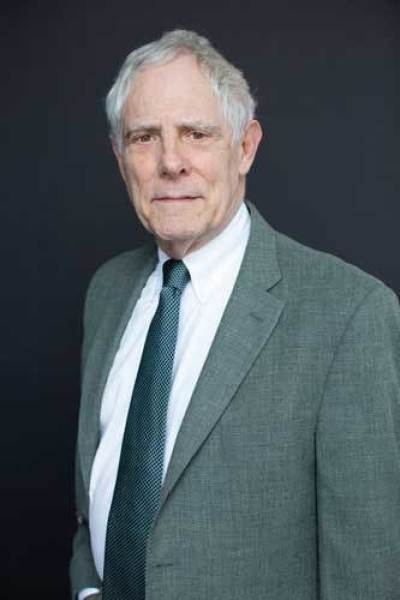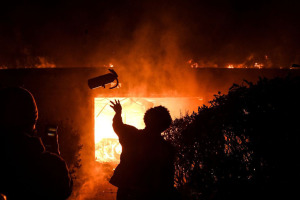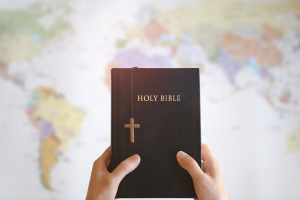The spiritual remedy for self-quarantine cabin fever

The following is adapted by Dr. Lewis Andrews from his new book,Living Spiritually in the Material World(Fidelis Books).
As people around the world self-quarantine with no clear end in sight, there is a growing restiveness for which the predictable advice of catching up on long-deferred chores or finding something new on Netflix goes only so far. For those of us long accustomed to the convenience of cars, subways, planes, and trains, it should be no surprise many have begun to feel tortuously confined.
Yet it is easy to forget the wide-ranging mobility we all miss is a very recent historical development. Little more than a century ago, almost every American lived on a remote farm, in an isolated hunter’s cabin, or in a small village.
Prior to the Industrial Revolution, helping rural Americans cope with seclusion was one of the Christian minister’s most important tasks. It was for this reason those who trained pastors — the clerical presidents of America’s early colleges and universities —thought a lot about Biblical solutions to the challenge of geographic confinement.
Unsurprisingly, prayers for Divine guidance and expressions of gratitude for daily blessings were considered as necessary to tackle this problem as any other. But the presidents also knew Scripture contained important teachings for specific problems —teachings which in the case of restless boredom had the power, not only to calm it, but to make believers even better for their trial.
The Great Insight
What the early college presidents learned from their reading of Scripture was what we today call “cabin fever” is in many ways psychologically similar to the experience of any person who has drifted too far from God. The self-quarantined individual may be more quick tempered, more susceptible to exaggerated fears, and more inclined to overeat — while the spiritually empty person tends to act out escapist fantasies involving drugs, illicit sex, or other irresponsible behaviors — but both are suffering from moodiness and discontent.
Of course, the one whose distress comes from a physical, as opposed to spiritual, isolation at least knows why he or she is miserable. This was why Princeton president James McCosh (1868–1888) took pains to warn graduating seniors that a cosmopolitan career might save them from the boredom of country living, but not from the psychological consequences of becoming too materialistic.
“You [will frequently] feel that there is something unsatisfying in these very comforts and enjoyments” you choose to pursue, he said. “The eye is not satisfied with seeing, nor the ear with hearing, nor ambition with success, nor the lust with gratification. Ay, there is something wanting, and you know it; you feel it at times, though you may not yet know what it is that would fill the void.”
Like another famous nineteenth-century college president, Yale’s Theodore Woolsey (1846–1871), McCosh knew this secular want of enjoyment “for which no earthly enjoyment can compensate” is just as likely to occur in the best of times as in the worst. Even when one’s personal and career dreams seem to be coming true and there is not a financial or health-related cloud in the sky.
The Christian Solution
If both physical and spiritual isolation produce a similar kind of cabin fever, the early college presidents knew, so they require a similar cure: to stop what one is doing in moments of desperation, to carve out sufficient time and space to turn inward, and to ask Jesus what he would want done. “The temptation to seek relief in change of circumstances rather than in change of self is perhaps peculiarly strong for Americans,” Oberlin College president Henry Churchill King (1902–1927) once observed, but in any pressured situation “there are always two conceivable ways of deliverance: the one, that of simple escape from the circumstances; the other, that of rising superior to the circumstances ….”
King, like every other clerical college president, understood the design of the Lord’s Prayer was no accident. It begins, not with “give us this day our daily bread,” “forgive us our debts,” or “lead us not into temptation” but with, “hallowed be Thy name. Thy kingdom come, Thy will be done in earth, as it is in heaven.” (Matthew 6:9–13)
The very act of deferring to Christ, even when extremely agitated or despairing, has the immediate effect of making one’s material conditions seem less dire, Franklin and Marshall College president John Williamson Nevin (1866–1876) would tell his students: “The simple act of turning to Christ is itself at once somehow felt to be an act of rest and peace, a sense of returning health, which no power on earth [can] give.”
“Though at first there is no perfect harmony in the soul when that step is taken, and all around still seems confusion and darkness,” Nevin went on to explain, the restlessness and sense of being hopelessly boxed-in will ebb over time. “There springs up … a light on the tempest-tossed sea of life, … a star of hope rejoicing the soul.”
As Scripture tries to inform us, “[K]nock, and it shall be opened unto you.” (Matthew 7:7) Or as it says in John 14:27: “Peace I leave with you, my peace I give unto you: not as the world giveth, give I unto you. Let not your heart be troubled, neither let it be afraid.”
Augustus Hopkins Strong, president and professor of theology at the Rochester Theological Seminary from 1872 until 1912, liked to tell the story of a young minister who once complained that all his projects, no matter how well-intentioned, always left him feeling moody and dissatisfied. Irritated and discouraged, he feared his studies had come to nothing and desired to know what he should do.
This man’s problem, Strong explained, was in looking for a dramatic change of external circumstances. He forgot God’s greatest gift is the knowledge one is working with and for Christ: “While he has been looking outside for this thing or that, for this communication or that, he has been ignoring the fact that the one unspeakable gift of God is Christ himself.”
In telling this story, Strong went on to confess that before he learned this lesson for himself, he typically worked in a “plodding, burdened, fearing, [and] distressful” way. “I had none of the joy that normally belongs to the Christian life,” he admitted.
It was not until he pondered the Scriptural words “I am the vine; ye are the branches” (John 15:5) when Strong realized the early disciples were full of hope and power just because they knew Christ was in them. They lived by faith in the Son of God, regardless their immediate situations. With that realization, Strong learned the “secret of Christianity and it wrought a great transformation in my experience.”
A Uniquely Favorable Position
Those of us self-quarantining in the common effort to flatten the coronavirus curve are in a uniquely favorable position to act on Strong’s wisdom. Not currently slaves to the tighter schedules and heightened social expectations of living in the larger world, we can more easily turn inward and ask for Christ’s guidance when especially stressed. Even with the demands of a large household, the customs required to negotiate conventional reality can be more comfortably suspended, freeing the soul to less self-consciously reach beyond itself.
Not everyone is fortunate enough to live near the ocean, a lake, or some other inspired setting, but our neighbors’ willingness to also self-quarantine has produced an additional benefit. The reduction in street noise, traffic congestion, and hurried activity in general has, in effect, returned us to a quieter time.
This slower pace of outside activity will, if we allow ourselves to appreciate it, constructively seep into our being. And as we turn our cabin fever over to Christ, we should not be surprised that ordinary sunsets, morning fogs, or passing rain showers begin to radiate a delightful, almost otherworldly, luminescence.
There is no need for self-quarantine to turn us into chained beasts which howl with rage and bite at our tethers or caged birds that fly about our little prisons looking for the first chance to escape. Our current restriction can, in fact, prompt the most profound liberation.
As America’s early college presidents advised seminary students about to head for the distant reaches of a vast and undeveloped country: the happiness of their parishioners would depend less, in the end, on any kind of civic progress than on their willingness to look up just as often as they looked around.
Dr. Lewis Andrews is the author of Living Spiritually in the Material World. He is the founder and president of the Children’s Educational Opportunity Foundation of Connecticut, as well as the author of many popular books and articles. Previously, he was the executive director of the Yankee Institute for Public Policy at Trinity College, Hartford



























